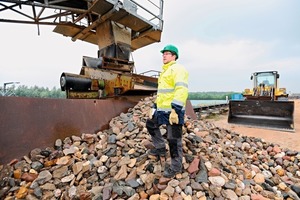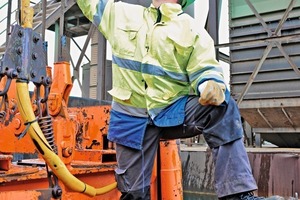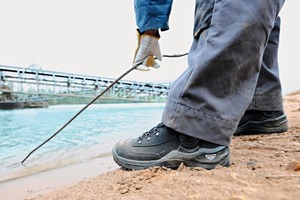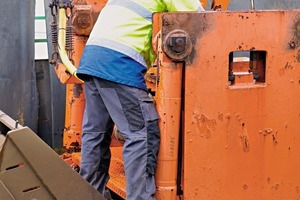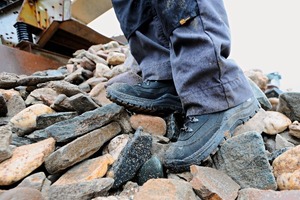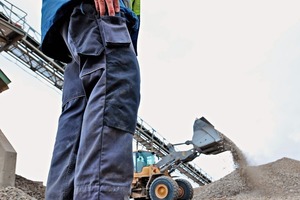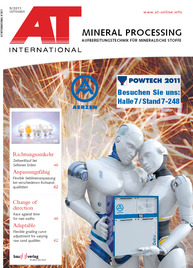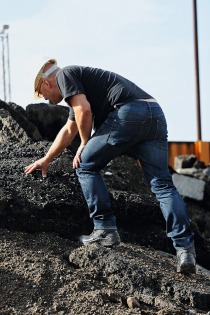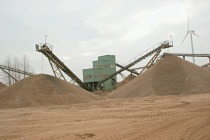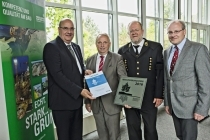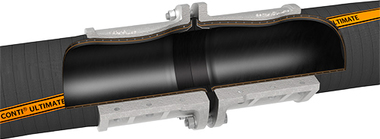Dry-footed through the gravel works
Rugged, anti-slip and comfortable to wear – the requirements to be met by safety shoes for day-to-day work at a gravel works would seem fairly easy to meet at first glance. The gravel works employees, however, are very seldom aware of how much research and high-tech is invested in modern safety footwear. The crucial criteria for using safety shoes are revealed by Willibrord van Bebber from the Welbers Kieswerke GmbH in the Lower Rhine region of Germany: from his many years of working in the field, he knows the essential features of good and at the same time safe workwear.
The right equipment can protect employees from accidents (Fig. 1) – and accordingly it can also reduce injury-related downtimes and operating costs. And for this reason, legislation and Accident Prevention and Insurance Associations prescribe the wearing of personal protective equipment (PPE) in many industries – for work in the extraction of gravel, sand and stones (Fig. 2) for ballast too. “Here, in our work at the gravel works, safety shoes of the class S3 are specified,” Willibrord van Bebber explains. The 43-year-old is a fitter at the Geldern site of the Welbers Kieswerke. “And anyone not wearing his safety shoes is not allowed at the workplace as he is completely unnecessarily putting his health and perhaps even his colleagues at risk. Moreover we risk our insurance coverage it we don’t work with the proper safety equipment.”
As the first feature that safety shoes should have, van Bebber mentions one that would seem to have little to do with foot protection at first glance: “Above all, our shoes have to be water-tight” There are two reasons for this: first the workers at the Geldern Gravel Works often have to work on wet ground because the minerals extracted are washed direct at the facility. Second the workers have to be protected when performing their duties in bad weather too (Figs. 3 and 4): “We work in all weathers, and that right through the year,” the fitter explains. “In rainy weather and in winter our feet have to stay dry as otherwise we’d be bound to catch a heavy cold after an eight- to ten-hour day in wet shoes. To guarantee that, the Welbers Gravel Works rely on protective footwear from a nearby supplier: the safety shoe manufacturer Elten is also based in the Lower Rhine region and has had its company headquarters in the small town of Uedem for more than 100 years. The family-run company is one of the technology leaders in the branch and has made a name for itself with field-oriented solution concepts – weather-proofing is a crucial factor.
With full tongue and a special combination of material for the upper consisting of hydrophobized, i.e. water-repellent, leather and high-tech textiles, good safety shoes are ideally protected against the ingress of water. To make sure shoes remain comfortable even after they have been worn for a long time, modern protective footwear is also fitted with breathable membranes. Like the shoes of van Bebber and his colleagues: So the Biomex Fusion S3 keeps feet dry and warm, while ensuring high wearing comfort thanks to an optimal fit (Fig. 5).
In a gravel works, the shoes also have to meet the requirements of Safety Class 3. This stipulates particular requirements for the tread of the sole, the toe and perforation protection (Fig. 6). “The steel midsole and the incorporated toe cap are extremely important in our work,” explains the fitter van Bebber.
S3 safety shoes additionally have to be anti-slip shoes and have a studded profile, which ensures firm footing outdoors even on soil and mud. With sophisticated techniques manufacturers such as Elten manufacture special soles in the tread of which stones cannot easily get stuck despite the heavy-duty studs. Modern protective footwear gives employees much more and also provides solutions for concrete problems from everyday operations – with the model Biomex Fusion S3 the Elten has set its sights on combating one of the most frequent causes of injury: ankle sprains. Stability is only provided by mid-height shoes and boots when these are new – during working very stiff and rigid footwear, however, tends to be cumbersome and can lead to very painful bruising. And once the shoe has been worn in, it provides much reduced stability for the ankle joints. On the basis of sport and occupational medicine research, Elten has therefore developed a special liner that adapts to the natural movement of the ankle joints – in this way the shoes of the Biomex Protection series protect the ankle joints without severely restricting movement or causing painful bruises. “Whether we are kneeling, squatting or just walking – we can rely on our safety shoes cope with it all but still provide good support.”
This is made possible thanks to a close look at natural human movement: with two pivotal points on the outsides, the special bootleg liner of the Elten shoes adapts precisely to the movement of the foot during walking or squatting, never working against it – the muscles do not have work against an overly rigid bootleg, bruising is avoided. Because the biomechanical synthetic encloses the heel and ankle joint, it stabilizes the ankle joint both reliably and durably. So in the case of a wrong step, it protects against injury with the associated serious consequences for the ligaments or broken bones. For Willibrord van Bebber, this is a convincing reason to rely on the high-tech foot protection from the Lower Rhine. “For our work here in the gravel works, the shoe has everything. And it looks good too.”

